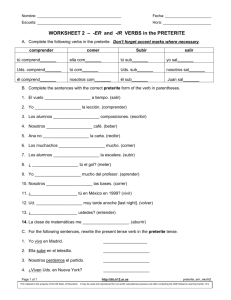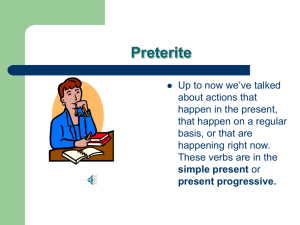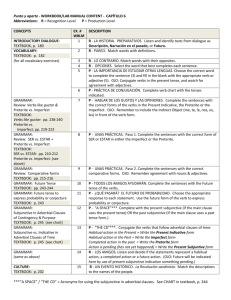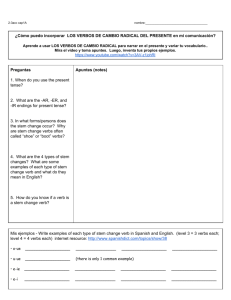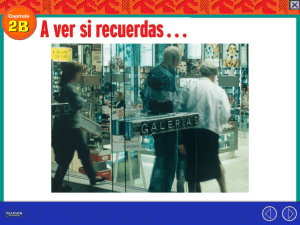compramos vendimos escribimos
advertisement
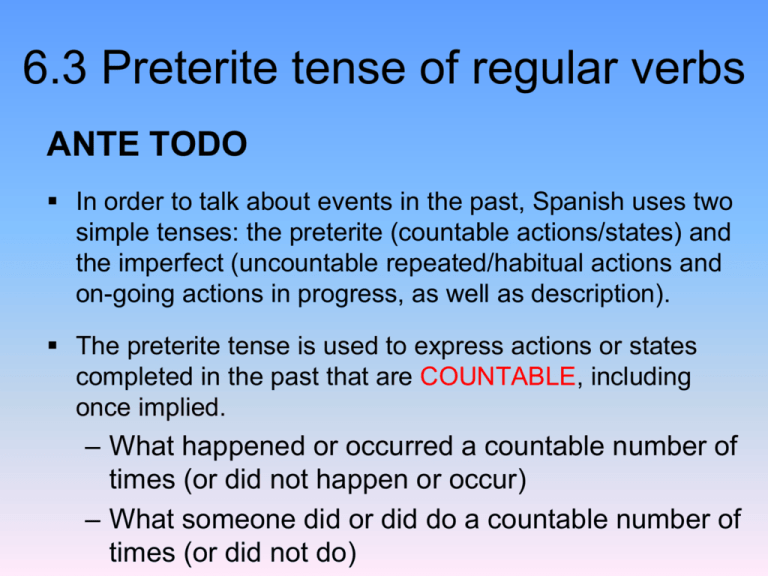
6.3 Preterite tense of regular verbs ANTE TODO In order to talk about events in the past, Spanish uses two simple tenses: the preterite (countable actions/states) and the imperfect (uncountable repeated/habitual actions and on-going actions in progress, as well as description). The preterite tense is used to express actions or states completed in the past that are COUNTABLE, including once implied. – What happened or occurred a countable number of times (or did not happen or occur) – What someone did or did do a countable number of times (or did not do) 6.3 Preterite tense of regular verbs Words commonly used with the preterite (Those without * don’t necessarily mean preterite, unless one time is implied.) anoche last night anteayer the day before yesterday ayer yesterday *de suddenly repente desde… from… pasado/a (adj.) last; past el año pasado last year la semana pasada last week *una vez once; one time *dos veces twice; two times *ya already hasta… until… Ayer llegué a Santiago de Cuba. Oí un ruido dos veces. Yesterday, I arrived in Santiago de Cuba. I heard a noise two times. 6.3 Preterite tense of regular verbs Remember that the stem of a verb tells the meaning. hablar = speak Remember that the –ar, -er, -ir ending tells the infinitive, which transates “to + verb.” It is unconjugated without a subject or tense. • hablar = to speak Remember that the ending of a verb tells the subject, the tense, and the mood. – Hablo I speak ( yo, present, indicative) – Hablaste You spoke ( tu, preterite, indicative) – Hable Ud. Speak. (Ud. imperative) 6.3 Preterite tense of regular verbs Preterite of regular –ar, –er, and –ir verbs -ar verbs comprar -er verbs vender -ir verbs escribir compré compraste compró vendí vendiste vendió escribí escribiste escribió compramos comprasteis compraron vendimos vendisteis vendieron escribimos escribisteis escribieron SINGULAR FORMS yo tú Ud. / él / ella PLURAL FORMS nosotros/as vosotros/as Uds. / ellos / ellas 6.3 Preterite tense of regular verbs ¡ATENCIÓN! The yo and (Ud. / él / ella) forms of all three conjugations have written accents on the last syllable to show that it is stressed. As the preceding chart shows, the endings for regular –er and –ir verbs are identical in the preterite. 6.3 Preterite tense of regular verbs Note that the nosotros/as forms of regular –ar and –ir verbs in the preterite are identical to the present tense forms. Context will help you determine which tense is being used. En invierno compramos la ropa en la tienda de la universidad. In the winter, we buy clothing at the university store. Anoche compramos unos zapatos de tenis y unas sandalias. Last night we bought a pair of tennis shoes and a pair of sandals. 6.3 Preterite tense of regular verbs The –ar and –er verbs that have a stem change in the present tense are regular in the preterite. They do not have a stem change in the preterite. cerrar (e:ie) PRESENT PRETERITE La tienda cierra a las seis. La tienda cerró a las seis. volver (o:ue) Carlitos vuelve tarde. Carlitos volvió tarde. jugar (u:ue) Él jugó al fútbol. Él juega al fútbol. 6.3 Preterite tense of regular verbs Ver is regular in the preterite, but none of its forms has an accent. ver vi, viste, vio, vimos, visteis, vieron 6.3 Preterite tense of regular verbs Verbs that end in –car, –gar, and –zar have a spelling change in the first person singular (yo form) only in the preterite. buscar llegar empezar busc- lleg empez- qu- gu- c- yo busqué yo llegué yo empecé Except for the yo form, all other forms of –car, –gar, and –zar verbs are regular in the preterite. 6.3 Preterite tense of regular verbs Three other verbs — creer, leer, and oír — have spelling changes in the preterite. The i of the verb endings of creer, leer, and oír carries an accent in the yo, tú, nosotros/as, and vosotros/as forms, and changes to y in the Ud. / él / ella and Uds. / ellos / ellas forms. (This applies to –er and –ir verbs with stems that end in a vowel.) creer cre- creí, creíste, creyó, creímos, creísteis, creyeron leer le- leí, leíste, leyó, leímos, leísteis, leyeron oír o- oí, oíste, oyó, oímos, oísteis, oyeron * Note: All preterite forms of these three verbs carry a written accent except for the (Uds./ellos/ellas) form. 6.3 Preterite tense of regular verbs ¡INTÉNTALO! Provide the appropriate preterite forms of the verbs. celebrar 1. Carlota _____. 2. Yo _____. 3. Los hombres _____. 4. Juan y yo _____. 5. Tú _____. comer 1. Las niñas _____. 2. Tú _____. 3. Usted _____. 4. Nosotros _____. 5. Yo _____. salir 1. Tú y yo _____. 2. Ella _____. 3. Paco y Anita _____. 4. Nosotros _____. 5. Yo _____. comenzar 1. Ustedes _____. 2. Vosotros _____. 3. Yo _____. 4. Miguel _____. 5. Tú _____. 6.3 Preterite tense of regular verbs ver 1. Ella _____. 2. Yo _____. 3. Las mujeres _____. 4. Mi amigo y yo _____. 5. Tú _____. buscar 1. Los estudiantes _____. 2. Tú _____. 3. Usted _____. 4. Nosotros _____. 5. Yo _____. oír 1. Tú y yo _____. 2. La madre _____. 3. Carlos y Teresa _____. 4. Nosotros _____. 5. Yo _____. jugar 1. Ustedes _____. 2. Vosotros _____. 3. Yo _____. 4. Francisco _____. 5. Tú _____. 6.3 Preterite tense of regular verbs Acabar de + [infinitive] is used to say that something has just occurred. (very recent past) Note that acabar is in the present tense in this construction. (acabo, acabas, acaba, acabamos, acabáis, acaban + de + infinitive.) Acabo de comprar una falda. I just bought a skirt. Acabas de ir de compras. You just went shopping. 6.3 Preterite tense of regular verbs ¡INTÉNTALO! Provide the appropriate forms of the very recent past (something just done) using the present tense of acabar + de + infinitive for these verbs. celebrar 1. Elena _____. 2. Yo _____. 3. Los chicos _____. 4. Emilio y yo _____. 5. Tú _____. comer 1. Los niños _____. 2. Tú _____. 3. Usted _____. 4. Vosotros _____. 5. Yo _____. salir 1. Tú y yo _____. 2. Ella _____. 3. Pablo y Elena _____. 4. Nosotros _____. 5. Yo _____. comenzar 1. Ustedes _____. 2. Nosotros _____. 3. Yo _____. 4. Marcos _____. 5. Tú _____.
